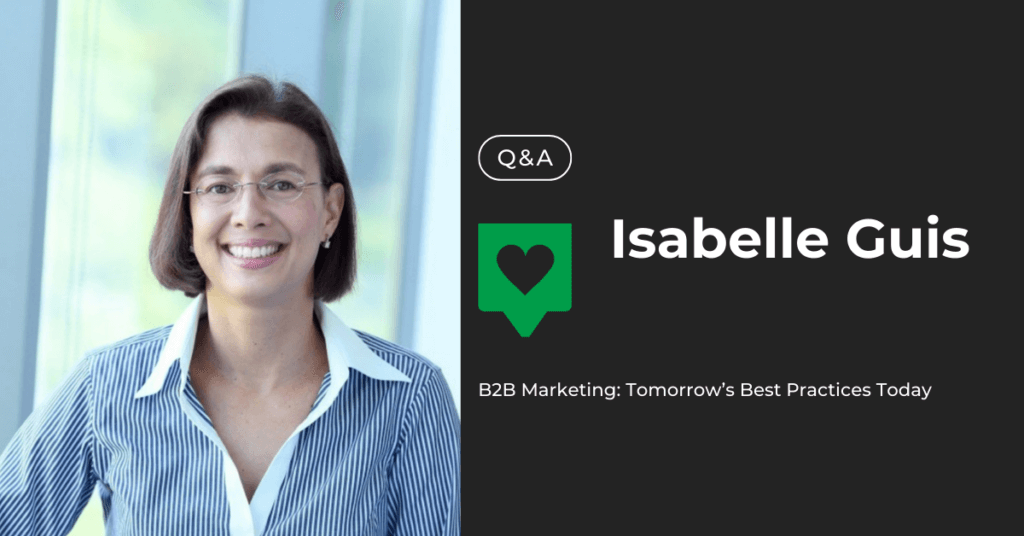From her first job working on speech recognition to her current roles as CMO of Tenemos and adjunct marketing lecturer at Santa Clara University, Isabelle Guis has a long history at the intersection of artificial intelligence and marketing.
In this conversation with author and executive coach Bryan Kramer, Isabelle shares her insights on the challenges and opportunities AI has to offer B2B marketers today.
This interview has been edited for length and clarity.
Bryan Kramer: What’s next for AI, particularly in marketing? AI is making waves across industries, but what excites you most about its applications in marketing?
Isabelle Guis: AI has always been closely tied to marketing. Marketers are early adopters of technology because it helps us scale, personalize, and segment markets more efficiently.
In 2020, there were already 8,000 applications in the marketing tech stack. AI was already there in forms like chatbots and data analytics.
The excitement today comes from generative AI. Traditionally, AI analyzed data passively, but now it can generate data, which opens up a lot of possibilities.
Content creation is one of the most promising applications. Generative AI can create personalized content faster, allowing marketers to remove bottlenecks and scale content for multiple market segments.
Bryan Kramer: Where do you think AI falls short today?
Isabelle Guis: AI is still in its early stages. One concern is whether we’ll all end up creating the same content because we’re feeding similar inputs into these tools. Another concern is the cost. AI requires a lot of processing power, and every time you generate content, you’re using resources. Measuring return on investment and using AI for specific tasks is essential.
Bryan Kramer: It feels like we’re in the Wild West, much like when the internet first started. What are your thoughts on AI’s potential in customer personalization, and where does it still need improvement?
Isabelle Guis: Personalization is a huge expectation from customers today. We’ve become accustomed to online purchases in our personal lives, and we carry those expectations into our professional lives.
The challenge is micro-segmentation. AI can segment markets, but until recently, we couldn’t keep up with content creation for each segment. Now, AI can help. But it’s not just about content; it’s about tailoring the entire customer journey.
AI can predict the next step in a customer’s journey, but the human touch is still critical. You need to maintain empathy, especially in scenarios where AI might not understand new regulations or nuances in customer needs.
Bryan Kramer: That’s a great point. Speaking of the human touch, how do you see AI and human collaboration evolving in customer interactions?
Isabelle Guis: AI can handle routine tasks and answer common questions, but there’s still a need for human intervention. It’s important to be transparent when customers are interacting with AI.
Customers should always have a way to speak with a human if needed. Generative AI is more sophisticated, so it will be interesting to see how we maintain that balance.
Ultimately, AI uses historical data to make predictions, but it can’t replace human creativity and empathy, at least not yet.
Bryan Kramer: I noticed that you hold both CEO and CMO titles. How do you balance these roles, and what’s your approach to leading a company while also driving marketing initiatives?
Isabelle Guis: At Bravo, a CRM company, I’m the Global CMO and CEO for North America. The roles are interconnected because Bravo operates as a product-led growth company. Marketing plays a significant role in driving growth, especially since we sell online with a freemium model.
In SaaS, marketing is tightly integrated with growth. The insights we gather from customer behavior and analytics are invaluable. Marketing is no longer just a cost center; it’s a revenue-generating function. That’s why it felt natural for me to take on both roles.
Bryan Kramer: That’s fascinating! How do you view the role of brand-building versus conversion-focused marketing?
Isabelle Guis: Everything converts in one way or another, even brand-building. It might not lead to immediate sales, but it creates awareness and brings customers into the pipeline.
A big event might not result in sales today, but six months down the line, those people could turn into leads. It’s important to track brand awareness and recognize that it plays a long-term role in growth.
Bryan Kramer: You’re also a professor at Santa Clara University, teaching marketing. What kind of conversations are you having with students about AI?
Isabelle Guis: Students are very informed about AI, often more than professionals because they have time to dive deep into research.
They ask great questions about privacy and data ethics, as well as how AI can balance automation with human oversight.
In the classroom, we discuss how much data is appropriate to collect and how to maintain customer trust while delivering value. We also talk about how to use AI without crossing ethical boundaries.
I’m currently updating my curriculum to include more on generative AI, and I’m excited to see how students will respond. They keep me on my toes, and I learn a lot from them as well.
Bryan Kramer: Thank you, Isabelle, for sharing your insights. It’s been a pleasure talking with you.
Isabelle Guis: Thank you, Bryan. It’s been a privilege to discuss AI and marketing with you. I could talk about it all day!
Ready to get started with B2B social media? Let’s talk!
